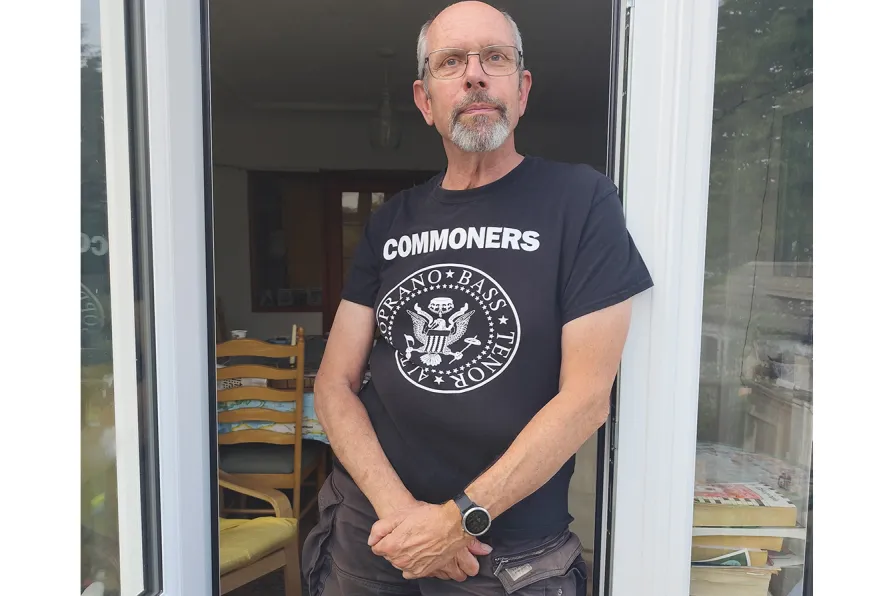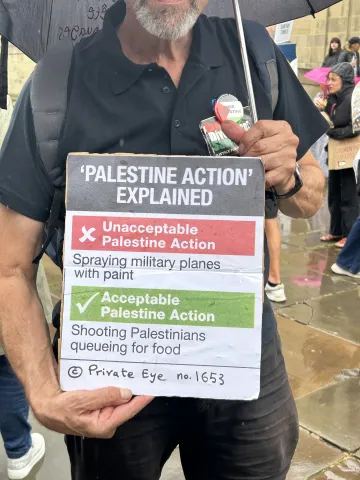Does widespread and uncontrolled use of AI change our relationship with scientific meaning? Or with each other? ask ROX MIDDLETON, LIAM SHAW and MIRIAM GAUNTLETT
Morning Star editor Ben Chacko speaks to JON FARLEY – the retired headteacher whose arrest in Leeds exposes the grim absurdity of the Palestine Action ban

 Jon Farley
Jon Farley
ARRESTS of protesters peacefully demonstrating against the ban on Palestine Action run into the hundreds; last weekend’s haul of 522 people in London is among the biggest mass arrests in British history.
The shocking scenes emphasise the sweeping character of the Terrorism Act and its prohibition on “expressing support” for a proscribed group — and police have been broad in their interpretation of what’s banned.

That came as a shock to retired headteacher Jon Farley, who made national headlines last month when arrested — for holding a printout of a satirical Private Eye graphic mocking the government’s double standards at a protest in Leeds.
“Unacceptable Palestine Action — Spraying military planes with paint. Acceptable Palestine Action — Shooting Palestinians queueing for food,” the graphic read.
Many of those arrested in London have set out to defy the ban, and hope to overwhelm the police through numbers. Farley has nothing but admiration for them: but he wasn’t in that category.
“I didn’t expect to get arrested. In fact beforehand somebody said to me, ‘Are you sure it’s going to be all right, Jon?’ and I laughed and said, ‘This has been in Private Eye!’
“I’d seen one or two arrests by West Yorkshire Police but these had mostly been people in altercations with officers, that sort of thing.
“I thought this placard was a bit different, and might get a bit of attention. As it was it was raining and hardly anybody saw it. Until I got arrested.”
He had joined a silent demo against Israel’s blockade preventing food getting into the Gaza Strip, which has resulted in hundreds of deaths from starvation on top of the tens of thousands its military has killed directly.
“I wanted to make the point that while Palestine Action had been proscribed, shooting people queueing up for food was still going on, and the government didn’t seem that bothered.”
Being arrested was a new, and terrifying, experience.
“At the time of my arrest, I didn’t know what was going on, I wasn’t panicking… but once I was in the van I thought ‘Oh God, this is real.’
“They were brusque, you know? They weren’t like ‘Look, you know, you can’t do this’ — they said ‘Can we have a word with you?’ and I said, ‘Have a word with me here,’ but they carried me to the side of the pavement and said, ‘It’s about your placard.’ And as I was saying it was from Private Eye they were handcuffing me.
“In the van they wouldn’t let me take the handcuffs off, they wouldn’t let me show them the magazine.”
Farley was later told the police van had driven ahead of the march, and as soon as the officers got out of it they went for him. “They targeted me.”
He was in a police cell for hours, and concerned his wife would be worrying. He asked police to phone her, but they didn’t — “in the end it was the solicitor who phoned her.
“I was being interviewed by two counter-terrorism police, and they started by saying ‘You know this carries a sentence of up to 14 years?’”
Farley was arrested under Section 12 of the Terrorism Act, which covers inviting support for or expressing support for banned organisations. At a recent meeting he met an activist from the UCU arrested under the same section — for carrying a sign saying that her union opposed the Palestine Action ban, a mere statement of fact. “It’s frightening, isn’t it?” he reflects.
“There are two strands to this. The whole proscription seems very much aimed at scaring people away from supporting the Palestinians; the government says it isn’t but it clearly is.
“But the other thing is it’s so cack-handed. People are arrested or not for doing the same thing in the same place. Different police forces approach it differently. After my arrest West Yorkshire Police even said, ‘any placard with the words Palestine and Action on’ would be banned: so in theory, if you wrote a placard saying ‘Down with Palestine Action’ you could get arrested!”
Farley was arrested on a Saturday and told on the Monday he would not be charged. Most of those arrested have not been, which confirms his suspicion that the punishment is the process — the arrests are mainly to intimidate.
“The Terrorism Act is very broadly phrased, and what it defines as terrorism seems absurd. It seems like a bad law to me, if I can be arrested as a terrorist, for God’s sake, for carrying a bit of cardboard, with a grim but pointed joke on it about what’s going on!”
As a retired headteacher, Farley is not most people’s idea of the sort of activist who troubles the police — and indeed the age profile of those arrested under the new ban shows a disproportionate number are pensioners. Does that show the anger at what is happening in Palestine has spread right across society, and isn’t confined to “the usual suspects?”
“I don’t like being framed as respectable,” Farley laughs. “Some of us old soldiers have been around this roundabout before…” He’s been in the Labour Party, campaigned against the winter fuel cuts, and back in the day was on the great march against the war in Iraq.
“Would I have done it if I was working still? I don’t know… if I had been arrested, that could have been catastrophic. I used to look at criminal record checks for staff we were employing, and I went on a course, and they said it’s not just offences of which you’ve been found guilty, it also considers ‘any police intelligence or notes’ — yes, I know the words ‘police’ and ‘intelligence’ don’t always go together!
“I volunteered for a while with a sailing club for disabled children, and had a criminal record check for that. So you wonder, would it put things like that at risk?
“So I do think more retired people are coming out because that threat of the sack doesn’t hang over them. I also wonder, if I had the same placard and I was a young Muslim lad from Leeds or Bradford, would I have been charged? Would I have been charged if I’d come up with those words, rather than it being from Private Eye, where they might have had to arrest [its editor] Ian Hislop too, or known I could call him as a witness?” Hislop, on hearing of the arrest, slammed it as “ludicrous.”
But Farley agrees there’s “a real disgust and anger” at the way things are in Britain, which is common across all generations, which encourages protest on issues beyond Palestine.
“I suppose it was the financial crash that made me think, ‘there’s something seriously wrong with this society. It needs a serious shake-up.’”
Like hundreds of thousands of others, he joined Labour under Jeremy Corbyn because it looked like it might change society, and has left under Keir Starmer, who obviously won’t. But — at the risk of tarring him with the “respectable” label he rejects — headteachers are not the stereotypical Corbyn supporters of Establishment propaganda, and cases like his do point to how widespread the desire for radical change actually is.
“I had no illusions about Starmer,” he begins, before correcting himself. “That’s not true. I did have illusions. I didn’t vote for him [as leader], but I can’t deny he’s been far worse, far more authoritarian, than I anticipated… he presented himself as this human rights lawyer!
“Corbyn did have a strong strain of popularity in the country. Starmer is far less popular than Corbyn ever was, but there’s no reflection from Labour, they seem set on their course.”
He remains on good terms with some in the local Labour Party, and has had messages of support from two local councillors. He’s approached his MP Fabian Hamilton, but not had a reply — “but he’s probably on holiday,” he says generously. The police haven’t apologised, and he’s looking into the possibility of legal action over his treatment.
The backlash against the ban keeps growing, and besides forcing the police into mass arrests of peaceful demonstrators that are being reported around the world, much of Establishment opinion feels the government has overreached. The Times has run scathing editorials denouncing the ban, and articles attacking it have even appeared in the Daily Mail. Will Home Secretary Yvette Cooper be forced to back down?
“Well, I can’t see how it can carry on. But with these people I wouldn’t like to say. Obviously there’s the judicial review.
“They’ve lost the room, haven’t they? Look at the opinion polls, people want sanctions on Israel, they want to suspend trade. I think Gaza is going to define this government. It feels like Iraq and Tony Blair to me.” But, since Starmer had nothing like Blair’s level of support to begin with, “I can’t even see them winning the next election.”
Farley is in Unite Community, and he is keen to work across unions to build resistance to the ban. “If any union branch wants, I’m happy to go and speak to them.” The Morning Star can forward requests to him. He’s also keen for people to sign the open letter at protestisnotterrorism.wordpress.com.
“I’m the accidental terrorist — I’ve realised I’ve become a poster boy for why this proscription is so absurd. People keep congratulating me for it.
“I’m not sure what for — being naive? But it’s woken me up a bit!”









